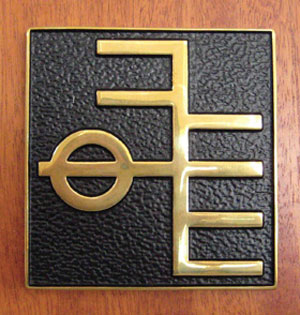Professional Mariner has presented the 2017 Samuel Plimsoll Awards for Outstanding Service to two marine pilots whose actions minimized the danger posed by an oil tanker ablaze in the Houston Ship Channel, and to a training provider that has implemented a collaborative simulation program to improve the navigation skills of mariners.
The 2017 Plimsoll Award for Innovation was given to a trio of companies that are leading an initiative to use drones to inspect ballast water tanks and offshore wind farms, with the goal of delivering safer and more accurate evaluations.
Professional Mariner honored Capt. Michael McGee and Capt. Michael Phillips of the Houston Pilots for their actions aboard the tanker Aframax River on the night of Sept. 6. The 810-foot ship caught fire and burned for an hour in the Houston Ship Channel, with flaming diesel spreading across the water and threatening other vessels and terminals in Buffalo Bayou.
“Capt. McGee was conning the vessel and undocking when the ship experienced an engine failure and struck two mooring dolphins,” Capt. Robert M. Shearon, the pilots’ presiding officer, said in a prepared statement 10 days after the incident. “As a result of the contact, a port fuel tank ruptured, causing a spill of diesel fuel that ignited and burned.”
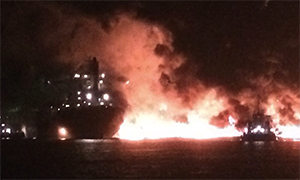 |
|
Capt. Michael McGee and Capt. Michael Phillips helped limit the danger posed by the burning Aframax River in the Houston Ship Channel. |
|
Courtesy U.S. Coast Guard |
McGee and Phillips, with 18 and 24 years of experience, respectively, as Houston Pilots, maintained their stations in the wheelhouse as flames covered the bridge wings. McGee maneuvered the ship toward the middle of the channel after the fire started, Shearon said, to minimize the threat to surrounding property. Phillips handled communications with the Coast Guard and coordinated firefighting efforts with two port fireboats and four tugboats from G&H Towing.
“One pilot’s face and hair were singed,” Shearon said. “The other pilot broke out and charged a fire hose and extinguished a fire on the port bridge wing himself.”
Once the fire was out, McGee guided Aframax River — unloaded at the time but carrying about 90,000 gallons of fuel — to a nearby dock. In testimony in December before the Pilot Board of Investigation and Recommendations Committee, Phillips said he had turned to McGee during the ordeal and warned, “We are going to die.” No injuries were reported among the ship’s 25 crewmembers.
In February, the Coast Guard presented McGee and Phillips with the Meritorious Public Service Award for their “prompt and effective response to a major marine casualty.” Chief Glenn Hood and Senior Capt. Kirk Beverung of the Port of Houston Fire Department also were honored, as were Capt. Douglas Scott and Capt. William Curry of G&H Towing.
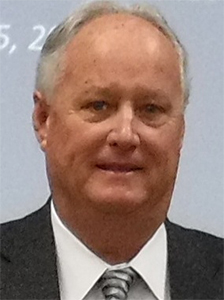 |
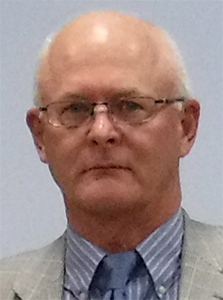 |
|
Capt. Michael McGee, left, and Capt. Michael Phillips. |
|
|
Courtesy U.S. Coast Guard |
|
“It really was one of the finest examples of state pilots protecting the waterway and citizens at their own risk,” stated the Plimsoll nomination for McGee and Phillips.
The Maritime Institute for Technology and Graduate Studies (MITAGS) and the Pacific Maritime Institute (PMI) received the 2017 Plimsoll Award for Outstanding Service by an Organization. The award recognizes the schools’ Navigation Skills Assessment Program (NSAP), a risk-mitigation initiative that helps mariners and operators identify critical safety gaps and implement solutions to close them.
NSAP uses custom simulation scenarios and assessment criteria based on a company’s skill requirements and area of operation, specifically focusing on the core skills required of licensed deck officers as defined by international standards and industry best practices. Competencies evaluated during the simulations include COLREGS/Rules of the Road, situational awareness, bridge resource management, company policies and procudures, communication and systems. Performance, from highly effective to unsatisfactory, is determined using a numerical point scale.
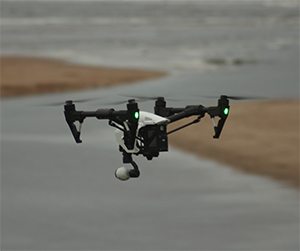 |
|
The RECOMMS project is developing aerial drones to handle the dangerous work of inspecting ballast tanks and wind farms. |
|
Courtesy AkzoNobel |
A report is produced at the end of each session and the facilitator debriefs the participants, summarizing their performance and providing an opportunity for feedback and discussion of lessons learned. Observations and recommendations may include further training or implementation of additional company procedures to close knowledge or skill gaps.
“NSAP has provided a safe and supportive environment (for mariners) to demonstrate their maritime and leadership skills and discuss with a respected peer how they can better themselves both professionally and for the safety of their crew, their vessel and the industry as a whole,” stated the nomination for MITAGS-PMI. “The program specifically offers a chance to self-reflect immediately after performing a set of tasks, allowing the individual to internalize and thereafter apply an improved skill or understanding of a rule to their jobs and professional lives.”
The program has grown beyond MITAGS in Baltimore and PMI in Seattle and has been implemented at training facilities in the United Kingdom, Croatia and the Philippines, with newly licensed centers being developed in Singapore and India.
The 2017 Plimsoll Award for Innovation recognizes an initiative led by AkzoNobel, Barrier Group and DroneOps Ltd. to develop miniature aircraft capable of remotely inspecting ballast tanks and wind farms. RECOMMS — Remote Evaluation of Coatings and Corrosion on Offshore Marine Structures and Ships — will use virtual-reality technology and semi-autonomous drones to handle the dangerous work now done by crew, surveyors and independent inspectors.
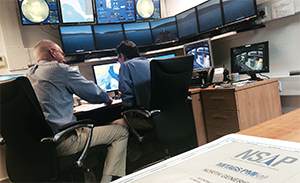 |
|
MITAGS-PMI’s Navigation Skills Assessment Program provides a safe and supportive environment for mariners to demonstrate their abilities. |
|
Courtesy MITAGS-PMI |
“Surveys of enclosed spaces and ballast water tanks are an essential part of routine maintenance on board vessels and offshore structures, and are increasingly critical for shipowners,” said Michael Hindmarsh, a spokesman for RECOMMS and business development manager at AkzoNobel. “However, inspecting these areas thoroughly can require working at height, entering confined spaces and negotiating slippery surfaces that could be poorly lit, all of which are high-risk activities that the maritime industry is keen to address.”
By replacing human inspectors with drones, routine maintenance can be monitored remotely in real time by office-based staff, “with instant feedback available to the vessel or offshore structure’s superintendent,” according to a RECOMMS news release.
The project is being funded by Netherlands-based AkzoNobel, a global provider of paints, coatings and specialty chemicals; Barrier Group, a tanker operator with headquarters in the United Kingdom; and U.K.-based DroneOps. Additional support is being provided by Innovate UK, Marine Technical Limits Ltd., Safinah Ltd. and Elcometer Ltd. Flight trials are planned for this year.

